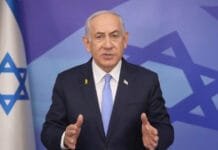Rising Tensions in the Middle East
The Middle East conflict has entered another volatile phase as Israel launched a surprise incursion into Syrian territory near Mount Hermon, sending nearly 60 soldiers across the border. Reports from the Syrian Foreign Ministry confirm that Israeli forces have seized multiple areas and detained six Syrian citizens. This aggressive move has been described by Damascus as a blatant violation of sovereignty and a direct threat to the fragile regional stability.
What makes the development even more significant is that Israeli Prime Minister Benjamin Netanyahu is said to be ignoring warnings and advice from U.S. President Donald Trump, choosing instead to pursue military objectives regardless of Washington’s concerns.
Syria Condemns Israel’s Action
According to official statements from Damascus, this incursion is a “dangerous escalation” that risks destabilizing the already war-torn region. Syrian authorities argue that the move undermines ongoing U.S.-mediated peace talks and could derail fragile negotiations between Damascus and Tel Aviv. The fact that the operation occurred in a zone notorious for arms smuggling routes used by Hezbollah and Palestinian factions adds further layers of complexity.
The Syrian President Ahmed al-Sharra, in response, urgently appealed to Washington for intervention, holding high-level talks with U.S. special envoy Thomas Barrack in Damascus.
The Strategic Importance of Mount Hermon
The incursion centers around Mount Hermon, a region strategically positioned near the Lebanon-Syria border. This area has historically been a critical hub for weapons trafficking, allegedly supplying Iran-backed Hezbollah and other militant organizations.
For Israel, Mount Hermon represents a national security red line. Israeli military sources recently released footage claiming to have uncovered weapons depots and smuggling tunnels in southern Syria. These revelations provided the justification for the latest incursion, with Israeli officials insisting the action was necessary to protect Israeli civilians and the Druze community living near the border.
U.S. Mediation Under Strain
Just days before the incursion, American envoy Thomas Barrack met with both Netanyahu in Jerusalem and President al-Sharra in Damascus to mediate peace talks. The discussions centered on reducing hostilities in southern Syria and possibly laying groundwork for a security pact that could open doors to broader political dialogue.
However, Israel’s sudden military move now threatens to undermine U.S. diplomacy. Syrian officials argue that Washington’s close alliance with Israel emboldened Netanyahu, yet even President Trump’s influence has failed to restrain Israeli aggression. This widening gap highlights how Netanyahu is prioritizing military strategy over U.S. mediation, potentially creating friction with the White House.
A New Frontline in the Syrian Conflict
The incursion risks opening a new military front in an already fractured Syria. Damascus is battling multiple internal and external threats, from rebel groups to ISIS remnants, while also managing tensions with Lebanon and Palestinian factions. Israel’s new presence near Mount Hermon places additional strain on Syrian forces and raises fears of a multi-front conflict.
The Syrian Foreign Ministry has warned that the occupation may ignite larger clashes with Hezbollah and other resistance groups, pulling Lebanon deeper into the conflict. Analysts suggest that this could spark a regional escalation, especially if Iranian-backed groups retaliate against Israeli positions.
Netanyahu’s Political Calculations
Netanyahu’s decision to act despite Trump’s stance reflects a calculated political gamble. Facing domestic challenges, including criticism over corruption scandals and protests at home, the Israeli Prime Minister is seeking to project strength and control over security matters. By targeting Syrian territory, Netanyahu aims to reinforce his position as the protector of Israel’s borders.
Furthermore, by showcasing evidence of weapons smuggling routes, Netanyahu strengthens his argument that Israel must take unilateral action when necessary. This strategy, however, risks alienating Washington at a critical time when the U.S. is attempting to broker fragile stability in the Middle East.
Syria’s Diplomatic Counteroffensive
In the wake of the incursion, Syria has embarked on a diplomatic offensive, rallying regional allies and appealing directly to Washington. The Syrian President emphasized that continued Israeli aggression will collapse ongoing peace initiatives and destabilize the balance of power in the Middle East.
Damascus insists that any U.S.-led mediation is meaningless unless Washington reins in its Israeli ally. The Syrian Foreign Ministry has already reached out to the United Nations, calling for urgent intervention and international condemnation of Israel’s actions.
Lebanon and Hezbollah Factor
The incursion’s proximity to Lebanon cannot be overlooked. The area around Mount Hermon has long been associated with Hezbollah operations, and Israeli officials fear that weapons smuggled through Syria could be used against Israel in a future confrontation.
By seizing these territories, Israel hopes to disrupt Hezbollah’s supply chains. However, this move could just as easily provoke a Hezbollah counterattack, drawing Lebanon further into the conflict. Hezbollah has previously vowed to retaliate against any violation of Syrian sovereignty, raising the possibility of a wider Israel-Lebanon confrontation.
The Broader Geopolitical Impact
This conflict transcends mere border skirmishes. The Israel-Syria confrontation represents a larger struggle over regional dominance and security architecture. For Israel, the priority is to neutralize threats posed by Hezbollah, Iran, and Palestinian militant groups. For Syria, the issue is about defending sovereignty and resisting foreign occupation.
The U.S. role remains critical, yet increasingly complicated. While Washington has traditionally supported Israel’s security concerns, the Trump administration now finds itself navigating between backing its ally and preventing the outbreak of a larger regional war.
Future Scenarios: Escalation or Diplomacy?
The unfolding crisis presents two possible trajectories:
Escalation into Wider Conflict – If Hezbollah and Iran respond militarily, Israel could face a multi-front confrontation involving Syria, Lebanon, and Palestinian factions.
Return to Negotiations – U.S. mediation could still revive peace talks, but only if Israel halts further incursions and Damascus agrees to confidence-building measures.
At present, the balance leans dangerously toward escalation, given the mounting mistrust and the collapse of diplomatic initiatives.
Conclusion: A Region on the Brink
The Israeli incursion into Syrian territory near Mount Hermon marks a critical turning point in the Middle East crisis. Netanyahu’s defiance of Trump underscores a shifting power dynamic, where Israel is willing to act independently even at the risk of alienating its strongest ally.
For Syria, the incursion represents a serious challenge to sovereignty, undermining both domestic stability and international diplomacy. With tensions rising near Lebanon and Hezbollah’s presence looming large, the possibility of a new regional war cannot be ruled out.
The coming weeks will determine whether this confrontation escalates into a full-scale conflict or whether Washington’s mediation efforts can pull the region back from the brink. What remains clear is that the Israel-Syria clash is not just about borders—it is about the future security balance of the entire Middle East.















